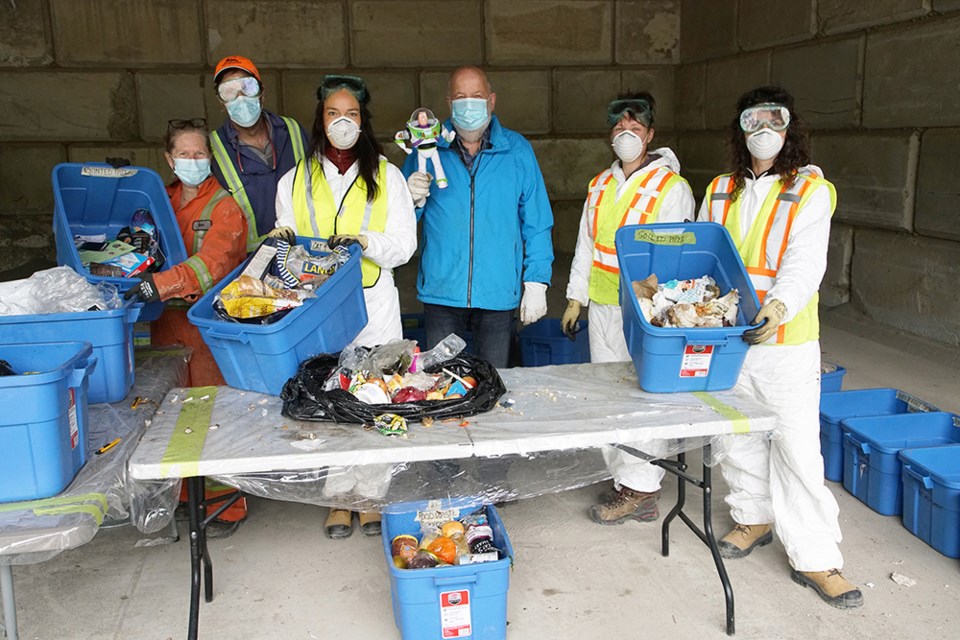Let’s Talk Trash team members and a consultant recently sorted through garbage to find out what people are throwing away throughout the qathet Regional District area.
Maura Walker, from Maura Walker and Associates Environmental Consultants, said the sort determines factors such as how much paper, how much metal and how much food is in the solid waste stream.
“We can see how well we are doing with existing services and programs and education and where our opportunities are to do better,” said Walker. “That’s what we are learning from sorting out an estimated 5,000 kilograms of garbage into every little piece. From that we’ll do some crunching to see what sources it came from – did it come from homes, did it come from businesses or construction projects – and then we can tailor programs and policies accordingly.”
From the food waste perspective, Walker said early data is showing that food waste is the biggest proportion by weight of what is being sorted through.
“That’s a huge opportunity to really get that out of the waste stream so it doesn’t have to be transported to a landfill; the food waste is a huge opportunity for improvement,” said Walker. “The other thing we are looking at is what are the opportunities for the new resource-recovery centre and all of these potential things that could be reused or recycled. We are taking a really close look to see what opportunities exist there.”
Walker said the intention of the study is to take a deep dive into nuances of this particular regional district, such as what people are throwing away and how the region is doing today, and what can then be done to make things better in the future.
Walker said after one day of garbage separation out of a planned five-day sort, what had been noted was a lack of recyclables in the waste stream.
“This is great; our initial take is that it means people are doing really well in terms of recycling,” said Walker. “The quantity of food waste we are seeing is quite high, but we have also seen that in other parts of the province as well. We’ve done these studies in other regional districts and that’s pretty common. The number one item by weight tends to be food.”
Insight important to future plans
The study of the region’s waste stream will be helpful for the development of the region’s new resource-recovery centre. Walker said determinations from sorting through the waste stream will assist future planning to maximize the potential of diverting materials. She said, for example, they are taking a look at textiles, determining what are synthetic fibres, what are natural fibres, and can they be recycled into another type of fabric.
“We are really deep-diving into things we think have potential at the resource-recovery centre,” said Walker.
She said the timing of the garbage separation is perfect because the regional district is looking at food waste collection in the future, as well as the resource-recovery centre opening in the near future.
“This should give the regional district a lot of insight,” said Walker. “We are separating the waste stream into 80 or 90 categories by the time we are done. We’ve seen everything from small batteries to paint cans, different types of clothing and textiles, and we’ve got lovely things like diapers and pet waste, so we have all of the glorious and gory categories covered.”
Walker said she will be working with the Let’s Talk Trash team to put together a report that reflects all of the data, and what are being seen as the biggest lessons learned from the exercise.
“It will be great to see the data at the end of it,” said Walker. “Early indications are that it is good news from a recycling perspective and it looks like the community is doing really well, but it also looks like there are opportunities to do even better.”
Let’s Talk Trash team member Tai Uhlmann said Augusta Recyclers had collaborated with the team on all of the logistics, getting the study group the proper samples and making crew available to work with them, to help know what’s in the region’s waste.
“I just wanted to extend a thank you to Augusta,” said Uhlmann, “for working collaboratively with Let’s Talk Trash.”



